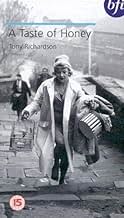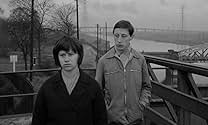ÉVALUATION IMDb
7,4/10
6,5 k
MA NOTE
Une adolescente enceinte doit se débrouiller toute seule lorsque sa mère se remarie, laissant sa fille livrée à elle-même avec un seul ami pour la soutenir.Une adolescente enceinte doit se débrouiller toute seule lorsque sa mère se remarie, laissant sa fille livrée à elle-même avec un seul ami pour la soutenir.Une adolescente enceinte doit se débrouiller toute seule lorsque sa mère se remarie, laissant sa fille livrée à elle-même avec un seul ami pour la soutenir.
- A remporté le prix 4 BAFTA Awards
- 10 victoires et 7 nominations au total
Michael Bilton
- Landlord
- (uncredited)
Eunice Black
- Schoolteacher
- (uncredited)
Hazel Blears
- Street Urchin
- (uncredited)
David Boliver
- Bert
- (uncredited)
Margo Cunningham
- Landlady
- (uncredited)
Shelagh Delaney
- Woman watching basketball
- (uncredited)
A. Goodman
- Rag and Bone Man
- (uncredited)
John Harrison
- Cave Attendant
- (uncredited)
Veronica Howard
- Gladys
- (uncredited)
Moira Kaye
- Doris
- (uncredited)
Linda Lewis
- Extra
- (uncredited)
Janet Rugg
- Girl on Pier
- (uncredited)
Histoire
Le saviez-vous
- AnecdotesShot exclusively on location, in Salford, Blackpool and a disused house in the Fulham Road in London that cost £20 a week to rent.
- GaffesWhile the teacher is reading from a book; at one point it cuts to two classmates who look back at Jo and start giggling. The cut is premature and makes no sense because when it cuts back to Jo, she is not doing anything to make them laugh. She is merely looking in a notebook. However it is in the next sequence of cuts when Jo begins to mimic the teacher thus causing the students to giggle.
- ConnexionsFeatured in Free Cinema (1986)
- Bandes originalesThe Big Ship Sails
(uncredited)
Traditional English children's song
Sung during the opening and closing credits
Commentaire en vedette
During the late fifties and early sixties a feature of the British film industry was what have become known as "kitchen sink" films- social-realist pictures focusing on the lives of ordinary working-class people. Tony Richardson was one of the key figures in this movement, and "A Taste of Honey" is one of a number of such films directed by him; others include "Look Back in Anger" from 1958 and "The Loneliness of the Long-Distance Runner" from 1962. All of these films are based upon literary sources, in the case of "A Taste of Honey" upon a play by Shelagh Delaney.
The main character is Jo, a working-class Manchester teenager. The plot is a fairly simple one and charts Jo's relationships with her sluttish mother Helen, her sailor boyfriend Jimmy, Helen's car-dealer lover (and later husband) Peter and Geoff, the young man who befriends Jo after Jimmy disappears back to sea leaving her pregnant. There are a number of fine performances, from Murray Melvin as the gentle, sensitive Geoff, Dora Bryan as the promiscuous Helen and from Robert Stephens as the relatively affluent but coarse and vulgar Peter. The best is probably from the nineteen-year-old Rita Tushingham, making her screen debut as the naïve and vulnerable yet determined and strong-willed heroine. She was to become a well-known figure in the British cinema of the sixties and seventies, even though she was far from having classic "film star" looks.
The film contains a number of elements which would have been highly controversial in the early sixties, in particular its non-judgemental attitude towards premarital sex and pregnancy and the mixed-race love affair between Jo and Jimmy. The British cinema was, in some respects, more liberal than its American counterpart at this period. I cannot imagine the Hollywood of 1961 making a film about a sexual relationship between a black man and a white woman. Still less can I imagine a Hollywood film about a sexual relationship between a black man and a white teenage girl, a theme which would probably still be off-limits in 2008.
There were, however, limits to British liberalism. A number of reviewers have assumed that Geoff is gay. Certainly, Melvin plays him with what might be seen as stereotypically gay characteristics- he is, for example, rather effeminate in his voice and gestures. He is also much more "domesticated" than Jo, being better than her at cooking, needlework and housekeeping. He is never, however, identified in the script as a homosexual; there is no reference to his having sex with, or being sexually attracted to, other men. Indeed, it is suggested that Geoff is romantically in love with Jo, and he even proposes marriage.
It should be remembered that, at the time this film was being made homosexuality was still illegal in Britain and there had never been a British film with an explicitly gay theme; the first such was "Victim", which opened in August 1961, only a month before "A Taste of Honey". When "The Trials of Oscar Wilde" came out the previous year it refused to admit that Wilde actually was a homosexual, but rather tried to give the impression that he was the victim of unfounded gossip, of a deliberate conspiracy to blacken his name and of perjured evidence.
Like a number of "kitchen sink" films, it has a strong sense of place, conjured up by its atmospheric black-and-white photography of Manchester scenes, especially the terraced houses of the working-class districts. We see recognisable landmarks such as the city's Town Hall, the Ship Canal and Blackpool Tower (Like many working-class Mancunians from this period, Jo and Helen take their holidays in Blackpool).
Another notable feature of the film is the presence of children. The film opens and closes to the accompaniment of the nursery rhyme "The Big Ship Sailed on the Alley-Alley-O", and in several scenes we see children playing outside. (Among them, apparently, is the future Government minister Hazel Blears). Richardson's intention was presumably to contrast the innocence of childhood with the cares of adult life and to stress that Jo is little more than a child herself. Indeed, when the film opens she is still a schoolgirl, probably aged fifteen, that being the age when most pupils left school in the early sixties, unless they were intending to obtain formal educational qualifications such as O-levels. Delaney herself was only seventeen when she wrote the play on which the film is based.
"A Taste of Honey" perhaps lacks the dramatic power of some of the social-realist films of this period, such as J. Lee Thompson's "Tiger Bay" or John Schlesinger's "A Kind of Loving". It is, however, a sensitive, well-acted and occasionally humorous look at human relationships and one of the better British films from this period. 8/10
The main character is Jo, a working-class Manchester teenager. The plot is a fairly simple one and charts Jo's relationships with her sluttish mother Helen, her sailor boyfriend Jimmy, Helen's car-dealer lover (and later husband) Peter and Geoff, the young man who befriends Jo after Jimmy disappears back to sea leaving her pregnant. There are a number of fine performances, from Murray Melvin as the gentle, sensitive Geoff, Dora Bryan as the promiscuous Helen and from Robert Stephens as the relatively affluent but coarse and vulgar Peter. The best is probably from the nineteen-year-old Rita Tushingham, making her screen debut as the naïve and vulnerable yet determined and strong-willed heroine. She was to become a well-known figure in the British cinema of the sixties and seventies, even though she was far from having classic "film star" looks.
The film contains a number of elements which would have been highly controversial in the early sixties, in particular its non-judgemental attitude towards premarital sex and pregnancy and the mixed-race love affair between Jo and Jimmy. The British cinema was, in some respects, more liberal than its American counterpart at this period. I cannot imagine the Hollywood of 1961 making a film about a sexual relationship between a black man and a white woman. Still less can I imagine a Hollywood film about a sexual relationship between a black man and a white teenage girl, a theme which would probably still be off-limits in 2008.
There were, however, limits to British liberalism. A number of reviewers have assumed that Geoff is gay. Certainly, Melvin plays him with what might be seen as stereotypically gay characteristics- he is, for example, rather effeminate in his voice and gestures. He is also much more "domesticated" than Jo, being better than her at cooking, needlework and housekeeping. He is never, however, identified in the script as a homosexual; there is no reference to his having sex with, or being sexually attracted to, other men. Indeed, it is suggested that Geoff is romantically in love with Jo, and he even proposes marriage.
It should be remembered that, at the time this film was being made homosexuality was still illegal in Britain and there had never been a British film with an explicitly gay theme; the first such was "Victim", which opened in August 1961, only a month before "A Taste of Honey". When "The Trials of Oscar Wilde" came out the previous year it refused to admit that Wilde actually was a homosexual, but rather tried to give the impression that he was the victim of unfounded gossip, of a deliberate conspiracy to blacken his name and of perjured evidence.
Like a number of "kitchen sink" films, it has a strong sense of place, conjured up by its atmospheric black-and-white photography of Manchester scenes, especially the terraced houses of the working-class districts. We see recognisable landmarks such as the city's Town Hall, the Ship Canal and Blackpool Tower (Like many working-class Mancunians from this period, Jo and Helen take their holidays in Blackpool).
Another notable feature of the film is the presence of children. The film opens and closes to the accompaniment of the nursery rhyme "The Big Ship Sailed on the Alley-Alley-O", and in several scenes we see children playing outside. (Among them, apparently, is the future Government minister Hazel Blears). Richardson's intention was presumably to contrast the innocence of childhood with the cares of adult life and to stress that Jo is little more than a child herself. Indeed, when the film opens she is still a schoolgirl, probably aged fifteen, that being the age when most pupils left school in the early sixties, unless they were intending to obtain formal educational qualifications such as O-levels. Delaney herself was only seventeen when she wrote the play on which the film is based.
"A Taste of Honey" perhaps lacks the dramatic power of some of the social-realist films of this period, such as J. Lee Thompson's "Tiger Bay" or John Schlesinger's "A Kind of Loving". It is, however, a sensitive, well-acted and occasionally humorous look at human relationships and one of the better British films from this period. 8/10
- JamesHitchcock
- 19 nov. 2008
- Lien permanent
Meilleurs choix
Connectez-vous pour évaluer et surveiller les recommandations personnalisées
- How long is A Taste of Honey?Propulsé par Alexa
Détails
- Date de sortie
- Pays d’origine
- Langue
- Aussi connu sous le nom de
- A Taste of Honey
- Lieux de tournage
- société de production
- Consultez plus de crédits d'entreprise sur IMDbPro
Box-office
- Budget
- 121 602 £ (estimation)
- Brut – à l'échelle mondiale
- 4 597 $ US
- Durée1 heure 41 minutes
- Couleur
- Rapport de forme
- 1.66 : 1
Contribuer à cette page
Suggérer une modification ou ajouter du contenu manquant

Lacune principale
By what name was Un goût de miel (1961) officially released in India in English?
Répondre

























